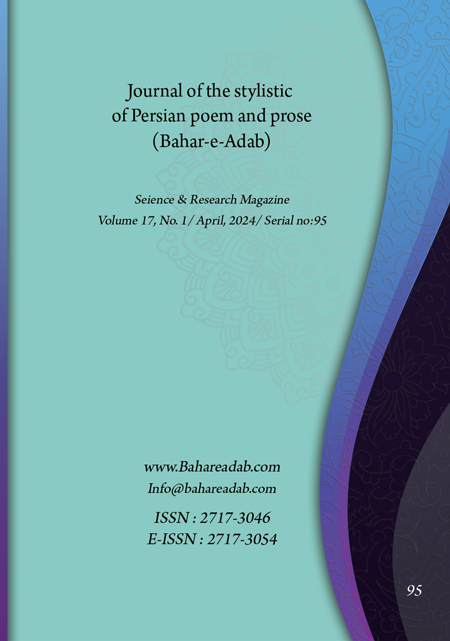- Count View : 568
- آدرس کوتاه شده مقاله: https://bahareadab.com/article_id/1614
- کد DOI مقاله: DOI:10.22034/bahareadab.2024 .17 .7303
Journal of the stylistic of Persian poem and prose
volume Number 17،
number In Volume 1،
،
issue Number 95
The components of carnival humor in Mashroote literature with an approach to Bakhtin's theory
Fahime Shahriary , Seyed Mahmoud Seyed (Author in Charge), Ali Ashoori
Abstract
BACKGROUND AND OBJECTIVES: The history of Persian literature has undergone tremendous changes and experienced many ups and downs following political and social developments. In this winding path, the Mashrote era has had a significant impact in various fields, especially in Persian literature. On the other hand, one of the main origins of humor in Persian literature is the Mashrote period. Since humorous literature with the help of carnival is considered a kind of innovation in the Mashrote period, the autopsy of this type of literature and the examination of its characteristics from different aspects and dimensions are of special importance. The effort made in this research is to analyze and examine the elements of carnival humor in the works of Ali Akbar Dehkhoda, Mirzadeh Eshghi and Nasim Shomal.
METHODOLOGY: In this research, an attempt has been made to investigate the carnival atmosphere governing Mashrote works according to Bakhtin"s carnival theory, and a descriptive-analytical method has been used to achieve the purpose of the research.
FINDINGS: It should be said that in most of the components of carnival humor in the works of these poets, there are examples and applicable materials that show that Mashrote humor can be explained and reconciled with Bakhtin"s theory of carnival humor.
CONCLUSION: Polyphonic discourse, relativity and juxtaposition of opposite concepts, disobedience to the ruling power, non-religiousness, having a Bohlol personality, grotesque, and carnival laughter or the laughter of death are the components that are used in humor in the works of these three Mashrote writers. Meanwhile, "Bohlulvar"s character" is the biggest component in the carnival humor of Dehkhoda"s works. Mirzadeh Eshghi has also used "disobedience to the ruling power" more than other components. Nasim Shomal, however, has preferred "polyphonic discourse" over other components.
Keyword
Carnival humor
, Persian literature
, Mashrote era
- Ahmadi, Babak. (1999). Structure and interpretation of the text, Tehran: Markaz.
- Bakhtin, Mikhail. (2008). Conversational Imagination: Essays on the Novel, translated by Roya Pourazer, third edition, Tehran: Ney Publishing.
- Biniaz, Fathullah. (2008). An introduction to story writing and narratology, Tehran: Afraz.
- Dehkhoda, Ali Akbar. (2001). Divan, by Mohammad Dabirsiaghi, Tehran: Tirazhe.
- Dehkhoda, Ali Akbar. (2016). Charand and Parand, third edition, Tehran: Azarmidokht.
- Gholamhosseinzadeh, Gharibreza and Gholampour, Negar. (2008). Mikhail Bakhtin: Life, Thoughts and Fundamental Concepts, Tehran: Rozgar.
- Gholamrezaei, Mohammad. (2008). Persian poetry stylistics from Rudaki to Shamlu, third edition, Tehran: Jami.
- Gilani, Ashrafuddin. (1996). Generalities of Seyyed Ashrafuddin Gilani (Nasim Shomal), with the introduction and attention of Ahmad Edarechi Gilani, Tehran: Negah.
- Halabi, Ali Asghar. (1986). An introduction to humor and humor in Iran, Tehran: Peyk.
- Karami, Mohammad Hossein; Riahi Zamin, Zahra and Dehghanian, Javad. (2008). "Research on the theory and function of constitutional satire" Persian language and literature researches, Isfahan University, new period, number 1, pp. 1-16.
- Karimi Moghari, Farideh and Shamim, Nasim. (2003). The life and poetry of Seyyed Ashrafuddin Hosseini Gilani (Nasim Shomal); Tehran: Sales.
- Knowles, Ronald. (2012). Shakespeare and Carnival after Bakhtin, translated by Roya Pourazer, Tehran: Hermes.
- Lechet, John. (1999). Fifty great contemporary thinkers from structuralism to postmodernism, translated by Mohsen Hakimi, second edition. Tehran: Khojaste.
- Meqdadi, Bahram. (1999). Dictionary of terms of literary criticism from Plato to the present age, Tehran: Fekr-e- Rooz.
- Mirzadeh Eshghi, Mohammad Reza. (1979). The illustrated collections of Mirzadeh Eshghi, compiled by Ali Akbar Moshir Salimi, Tehran: Javidan.
- Qaed, Mohammad. (2010). Eshghi: The Noble Face of an Anarchist, Tehran: New Design.
- Todorov, Tzutan. (1998). Conversational Logic, translated by Dariush Karimi, Tehran: Makraz.

